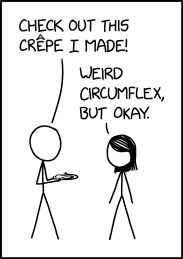Crêpe

A medicine that makes you put two dots over your letters more often is a diäretic.

A medicine that makes you put two dots over your letters more often is a diäretic.
Cueball has made a crêpe, a thin pancake known for its legendary status in French cuisine, which he proudly announces. However, the circumflex (the accent above the e) is written strangely. Instead of the usual simple angle (^), it looks more like the outline of a flattened arrowhead (⮝). Megan, who can apparently hear the orthography of spoken text, comments on the odd shape with an appropriate pun.
Megan's response, "Weird circumflex, but okay" is a play on the recent expression Weird flex, but ok. A "flex" is bragging about something. A "weird flex" is used when the speaker acknowledges (perhaps ironically) that the first person is attempting to brag about something, but doesn't recognise the thing as brag-worthy.
In some dialects of English (e.g. British English), and in the original French pronunciation, "crêpe" is said so that the ê is pronounced as in "get" (i.e. /krɛp/), but American English speakers pronounce it like an "A" (i.e. /kreɪp/).
The title text continues the wordplay by saying that "A medicine that makes you put two dots over your letters more often is a diäretic".
The word diäretic is a pun on diuretic (a substance promoting increased urine production or diuresis), diaeresis (a symbol in the form of two dots placed above a vowel, as the ä in the made up word diäretic; the adjective form of diaeresis can be spelled "dieretic") and diacritic (a glyph added to a letter to distinguish its sound from the normal version, what both the circumflex and the diaeresis are). See also the comic 1647: Diacritics about the use of these. Taking a diäretic medicine would supposedly cause you to use diaereses (also known as umlauts) över möre lëtters thän wöuld üsuallÿ bë thë cäse.
Diacritics are rarely used in English, potentially because of the diverse set of origin languages it developed from, or the wide variation of pronunciations within one nation, but are a common feature of other languages. In English, they are normally only seen in specific loanwords (such as crêpe) or used for emphasis or decoration (for example the metal umlaut seen in rock bands like Motörhead, Mötley Crüe, Queensrÿche, or Spın̈al Tap). The exception to this is the diaresis, which when it is used at all, is placed over the second vowel in a double-vowel word to indicate a morphological break between them as opposed to a diphthong (e.g. naïve or coöperation). The diaresis is optional, and, especially with words beginning with the co- prefix (e.g. cooperation, coevolution, or coincidence), rarely used. The New Yorker magazine is a famous outlier, advising consistent use of the diaresis in its style guide.